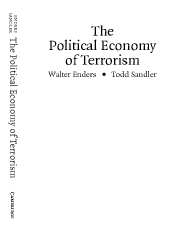Crossref Citations
This Book has been
cited by the following publications. This list is generated based on data provided by Crossref.
Sandler, Todd
and
Enders, Walter
2005.
September 11 and Its Aftermath.
International Studies Review,
Vol. 7,
Issue. 1,
p.
165.
Mirza, Daniel
and
Verdier, Thierry
2006.
International Trade, Security and Transnational Terrorism: Theory and Empirics.
SSRN Electronic Journal,
Lutz, Brenda J.
and
Lutz, James M.
2007.
Terrorism in America.
p.
95.
Barros, Carlos Pestana
Proença, Isabel
Faria, João Ricardo
and
Gil‐Alana, Luis A.
2007.
ARE USA CITIZENS AT RISK OF TERRORISM IN EUROPE?.
Defence and Peace Economics,
Vol. 18,
Issue. 6,
p.
495.
du Clos, Sébastien Tournyol
and
Tournyol du Clos, Sébastien
2008.
L’étude du terrorisme en France : une recherche encore embryonnaire.
Sécurité globale,
Vol. N° 3,
Issue. 1,
p.
97.
2008.
Ursachen und Wirkungen des weltweiten Terrorismus.
p.
111.
Barros, Carlos P.
Caporale, Guglielmo Maria
and
Gil‐Alana, Luis A.
2009.
BASQUE TERRORISM: POLICE ACTION, POLITICAL MEASURES AND THE INFLUENCE OF VIOLENCE ON THE STOCK MARKET IN THE BASQUE COUNTRY.
Defence and Peace Economics,
Vol. 20,
Issue. 4,
p.
287.
Meyer, Kevin L.
2010.
Cross-Industry Consequences of Terrorism.
SSRN Electronic Journal,
Gupta, Dipak K.
Horgan, John
and
Schmid, Alex P.
2010.
The Faces of Terrorism.
p.
123.
INTRILIGATOR, MICHAEL D.
2010.
THE ECONOMICS OF TERRORISM.
Economic Inquiry,
Vol. 48,
Issue. 1,
p.
1.
Murshed, Syed Mansoob
2011.
THREAT PERCEPTIONS IN EUROPE: DOMESTIC TERRORISM AND INTERNATIONAL CRIME.
Defence and Peace Economics,
Vol. 22,
Issue. 2,
p.
181.
Haphuriwat, Naraphorn
Bier, Vicki M.
and
Willis, Henry H.
2011.
Deterring the Smuggling of Nuclear Weapons in Container Freight Through Detection and Retaliation.
Decision Analysis,
Vol. 8,
Issue. 2,
p.
88.
Bapat, Navin A.
2012.
Understanding State Sponsorship of Militant Groups.
British Journal of Political Science,
Vol. 42,
Issue. 1,
p.
1.
Dixit, Priya
2012.
Relating to Difference: Aliens and Alienness in Doctor Who and International Relations.
International Studies Perspectives,
Vol. 13,
Issue. 3,
p.
289.
Clauset, Aaron
Gleditsch, Kristian Skrede
and
Holme, Petter
2012.
The Developmental Dynamics of Terrorist Organizations.
PLoS ONE,
Vol. 7,
Issue. 11,
p.
e48633.
Landman, Todd
2012.
Mexico’s Struggle for Public Security.
p.
99.
Asal, Victor
Deloughery, Kathleen
and
Mabrey, Dan
2012.
Country susceptibility to rail infrastructure attacks.
Journal of Transportation Security,
Vol. 5,
Issue. 4,
p.
293.
Schrodt, Philip A.
Yonamine, James
and
Bagozzi, Benjamin E.
2013.
Handbook of Computational Approaches to Counterterrorism.
p.
129.
Clauset, Aaron
and
Woodard, Ryan
2013.
Estimating the historical and future probabilities of large terrorist events.
The Annals of Applied Statistics,
Vol. 7,
Issue. 4,
Paraskevas, Alexandros
2013.
Aligning strategy to threat: a baseline anti‐terrorism strategy for hotels.
International Journal of Contemporary Hospitality Management,
Vol. 25,
Issue. 1,
p.
140.



